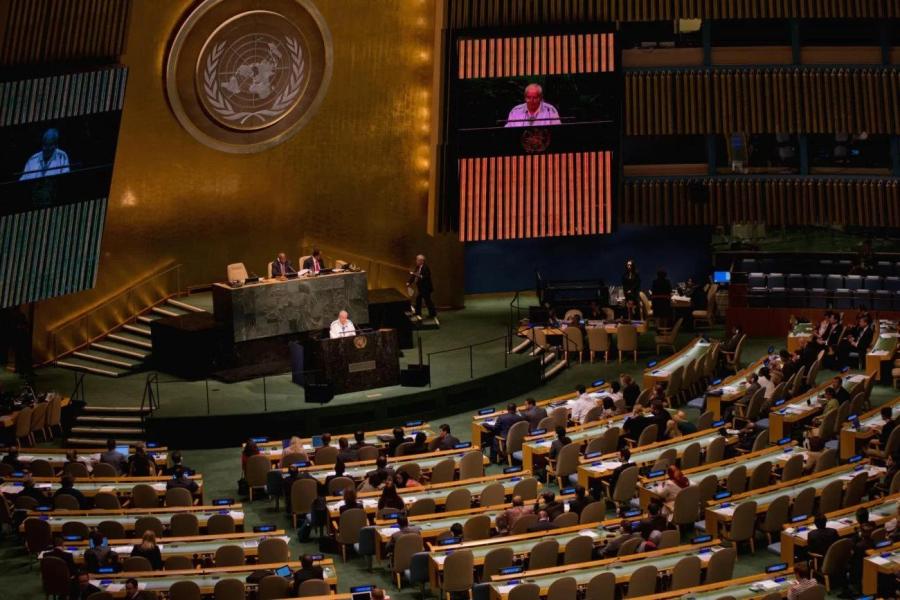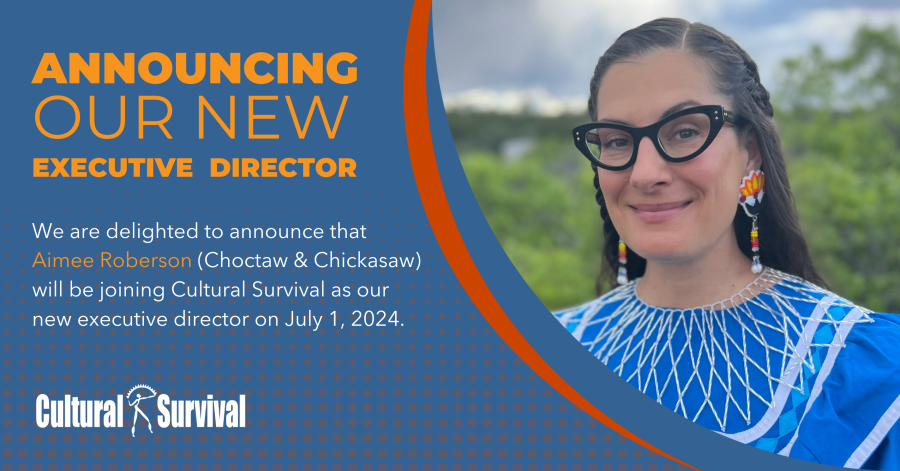
By Sabantho Aderi Corrie-Edghill (Lokono-Arawak)
As a young Indigenous woman of Guyanese Lokono-Arawak Tribal origin and heritage, born and raised in Barbados, I feel responsible for amplifying the voices of my brothers and sisters who disproportionately face climate issues head on in the region.
In the Caribbean, we are a mix of Indigenous, African, Asian, and European Peoples, who come from various socio-economic backgrounds. Caribbean Indigenous Peoples are still mostly viewed as extinct relics of a bygone era - and thus summarily confined to the dustbin of history, when in truth and in fact - we are surviving peoples and cultures, having constantly to redefine and defend our continuing existence in a contemporary Neo-Colonial world that prefers us to remain invisible to their usurping dominant societies that were illegally built in our lands and illegally forced upon our backs over 500 years after the genocide Christopher Columbus first unleashed in our region of the Americas and Caribbean. As Indigenous Peoples, we are at the frontlines of climate change due to our lifestyles and our reciprocal relationship with Mother Earth, our environment, and this experience is also shared across many villages, communities, islands, and the Caribbean region as a collective.
The long history of colonialism for the extraction of goods like sugar, coffee, cocoa, cotton, bananas, rice, citrus fruit, coconuts, and tobacco has impacted our food sovereignty and left our region dependent on imports from Europe and the United States, which has put us at a huge disadvantage in not only our self-sufficiency but also our ability to navigate and compete with today's global economy.
Hundreds of years of extractive colonialism have kept the Caribbean in a constant loop of economic dependency on other more influential continental governments. Tourism is one of the most important parts of the Caribbean Community and Common Market (CARICOM), which is an intergovernmental organization of 15 countries in the Caribbean with the purpose to promote economic integration and collaboration between its member states while also ensuring the benefits from the integration are equitably shared. . As we have seen, climate change adds another layer of threat to our economy due to our dependency on tourism as our main attractions like beaches due to erosion, coral bleaching due to temperature increases are slowly vanishing and will continue to if we cannot find a way to slow the process down and take steps toward prevention and reverse the effects as well as the increase in the frequency of droughts which affects the availability of water.
In Barbados, the impacts of climate change are visible as sea-levels rise, coastal erosion persists, and land slippage occurs. The United Nations Secretary-General António Guterres visited Barbados and witnessed these impacts himself, accompanied by our Prime Minister Mia Mottley, who is our first lady Prime Minister and the first ever to be so vocal on climate change in our region, she has also become famous for persuading creditors to accept a natural-disaster clause which is a sovereign debt contract giving the government a break from principal and interest payments in the event of calamity strikes and making us one step closer to safe proofing our islands finance. Prime Minister Mia Mottley is constantly advocating internationally on behalf of the Caribbean in relation to Climate Change to ensure that our issues are kept at the forefront.

Photo by Andrew John Chadwick
What was not mentioned during Guterres’ visit was that we, and many other Caribbean islands and nations, have observed a change in the rainy season, which was once months of daily moderate rainfall, to spans of days of dry heat broken by sudden deluges that result in flash flooding, which is destructive to our food systems.
Our dry seasons are also getting drier and hotter each year. More than half of our population lives on or near the coast and 95 percent of our tourism-related areas and important infrastructures such as the main government buildings, all the security forces buildings, all the desalination plants, and electricity generation facilities, and most of the financial headquarters for the island's economy are also found in these areas.
Source: Inter-American Development Bank
The change in weather patterns is also affecting our food sources and our abilities to practice our cultures. One of our seasonal delicacies is sea eggs (Tripneustes ventricosus) which are very quickly disappearing from our shores, which directly threatens our food security and seasonal cultural practices. This year, we had one of the lowest recorded numbers of sea eggs harvested as our divers have reported that in areas where we would commonly find them couldn’t find any, and in other areas the sea eggs were extremely immature at a time when they should be fully matured. Therefore, sea egg season, which is a big part of the local Barbados culture, could not be opened this year. This raises the question of what other delicacies and ways of living in the coming days, weeks, months, and years will become inaccessible or obsolete all together due to climate change?
Our relatives across the sea on the Island of Dominica, Chief Irvince Auguiste of the Dominica Kalinago tribe says that their experience of climate change is twofold, “The deforestation of certain water catchment areas for farming has affected the quantity of water in several rivers that are fed by multiple mountain streams. The traditional farming practices of land preparation for the cultivation of food are more unpredictable due to the changes in the weather patterns. Usually, farmers would cut down the land in the dry season around February or March and then plant in time for the upcoming wet season in May and June but nowadays the weather pattern is very different - and now completely unpredictable.”
Chief and President of the United Confederation of Taino Peoples, Roberto Mukaro Borrero, shares, “The Taino in Borikén/Puerto Rico say that climate change is already here and that current indicators suggest that they will experience longer dry periods interrupted by more intense storms which will increase fresh water scarcity and unusual heat at unusual times and coastal erosion.”
Moreover, in my own Indigenous community in Guyana, considered an extension of the Caribbean region, our Mahoka (Mahaica) River used to flood once in a decade during the rainy season, but since 2019 flooding has occurred every single year, and now the dry seasons are drier and hotter. Farmers used to be able to work with exposed backs from 7 am to midday, then take a two-hour rest and put in another three hours till 5 pm, then walk back home. Now the sun and heat are so unbearable that they have to cover their skin and work shorter days due to the intense weather conditions. Twenty-five percent of formerly productive hours are lost to each day with only six hours of labor possible because no one lives on the Tribal farmlands as they are many miles from the village.
In Barbados, as well as in the Caribbean region, most of our population lives and works within the coastal zone. Climate change projections say that coastal erosion is certain, along with a high risk of displacement for our coastal communities. Last but not least, it is predicted there will be a loss of tourism, due to expected eutrophication, ocean acidification, and sedimentation of coastal waters, and coral bleaching.
For Caribbean countries and islands with bodies of fresh water, their resources are already stressed as a result of forest and wetland depletion and degradation which also affects water quality. Fresh water is an invaluable life source for all living things, and the need for freshwater continues to increase due to the high water consumption of a growing population, extreme heat, agriculture, and other local and tourist community needs. In addition, the impacts of climate change are expected to lead to more contamination of water supplies through salt water intrusion, further forest and wetland depletion, and degradation, resulting in a decrease in water quality.
Access to fresh water also impacts agriculture. In the Caribbean, agriculture is the second most important source of employment and foreign exchange earnings. In addition, Caribbean fisheries supply 15 percent of our protein intake and the fisheries sector is also vulnerable to climate change due to rising sea level temperatures. Some of our most vulnerable communities are fisherfolk whose livelihoods are dependent on the wellbeing of fish and the sea. Climate change will likely cause a reduction in our agricultural and fisheries productivity which will, in turn, impact employment, earnings, and local food production and increase the risk to our food security.
Local Actions to Combat Climate Change
In the face of all these obstacles in terms of marine-related climate change coping efforts, one very promising action some of our nations have taken is to establish marine protected areas. These areas are lessening climate change pressures, thus with the goal to make fisheries more resilient in addressing the constant changes while strengthening ecosystems to support healthy fisheries and food sources for future generations. In a few of our nations, the Caribbean Fish Sanctuary Partnership Initiative has trained, equipped, and given boats to community-run sanctuaries, resulting in an increased number of fish inside and outside of these areas.
In St. Lucia, there are distinct zones marked as marine reserves, fishing priority areas, multiple-use areas, recreational areas, and yacht mooring sites. In these areas, St. Lucia has proven increased fish stock in and around the reserves that are healthy and show promise of increased resilience to climate change. Another example of project success is in Belize, where fisherfolk who consist of all ethnicities including Indigenous and Afro-Indigenous communities that have historically fished certain newly restricted areas will continue to have their human right to fish in those areas and with these new specified rights to these communities they are also given responsibilities related to the preservation of these ecosystems and have become partners in data collection, verification, and decision-making of the fisheries. This approach has so far resulted in sustainable catch rates improving and the decline in habitat health has stopped which in turn shows steps towards climate change resilience.
In Grenada, the government and community are working hand-in-hand on a project called “The Nature Conservancy’s At the Water's-Edge,” formed to create community action plans connecting social and physical vulnerabilities. They are testing hybrid reef technology by designing artificial reef structures to reduce wave energy and coastal erosion and to support coral growth and biodiversity. They are also training locals to plant and care for mangroves which will restore coastal vegetation to form a natural coastal defense. This project through its completion is designed to reduce 80-90 percent of wave energy for up to 30 years.
Fisherfolk as individuals have not been forgotten in these climate change resilient efforts either, as some nations have created insurance for fisheries called the Caribbean Oceans and Aquacultures Sustainability Facility (COAST). COAST is a parametric/index-based insurance aimed to make fisheries resilient to climatic events through giving funds directly to those in the fishing industry in the event of bad weather, storms, or hurricanes. Pay-outs will provide compensation immediately for lost income and damage related to fishing equipment so that fisher-folk can quickly be relieved and return to their trade as soon as possible. Along with insurance for fisheries, a mobile phone application is also being rolled out called FEWER. FEWER was developed by the ICT4 Fisheries Consortium and will send alerts of bad weather conditions and sea states to fisherfolk giving them early warnings of possible dangers and it allows fisherfolk to also share live information on local conditions and on missing people at sea.
When it comes to emissions, Barbados is striving to become a low carbon economy through sustainable energy usage and developments and lower the cost of climate-related adaptation which we will reap benefits from as a nation and region as a collective. In 2020 Barbados became the first country in the Caribbean to deploy electric buses which was done under the Barbados Transport Board for the benefit of public transport in our island and the significance of these electric buses is much lower greenhouse gas emissions than diesel-powered transit buses. By 2030, Barbados also plans to have 100% of its energy consumption come from renewable sources.
Furthermore, when it comes to agriculture and land management in our region, Caribbean nationals have become more aware of the risks, threats, and opportunities arising from climate change at the regional and national levels. Many projects on large and small scales are taking place throughout the Caribbean supporting the development and implementation of comprehensive awareness strategies and action plans, through mass media production and distribution, training and workshops, soil conservation, reforestation, flood mitigation, land and river bank stabilisation and water conservation.
In Jamaica, they are distributing water to farmers and want to begin harvesting rainwater and creating mini dams for irrigation. They have also begun to grow their crops using greenhouse technology and hydroponics.
As necessary and smart as all these climate change coping implementations are, the reality of them being replicated in other nations in our region isn't possible due to difficulties in accessing adequate financing and benefitting from the broader global economy. Many Caribbean states have been experiencing a financial crisis with economic activity shrinking and debt levels continuing to rise along with this investment flows and donor resources from abroad have also been dwindling. Many difficult budgeting decisions in the region are being undertaken, resulting in monetary and fiscal tightening. Many nations are still recovering from climate change-related disasters, economic instability, political instability, and the lack of technical and financial resources. One of the biggest challenges for the Caribbean is that agricultural issues and food security have not been part or a focus of any international discussions and their outcome documents.
We hope that the voices of our Caribbean farmers and agricultural communities can be heard at the United Nations Framework Convention on Climate Change (UNFCCC) Conference of Parties (COP26) and be included in the negotiations, and reflected in UNFCC’s international policies framework and in future climate agreements. Climate-smart agriculture will offer our region crucial benefits in food security, mitigation, and adaptation to climate change and COP26 is crucial in achieving new international agreements that apply to all countries. Lastly, across the Caribbean and the world, Indigenous voices also need to be centered in addressing climate change, as our knowledge systems know best how to steward our lands, territories, and natural resources and we hope our voices, challenges, and experiences are heard and acted upon.
Figure: Overall climate vulnerability. Source www.gov.uk.
— Sabantho Aderi Corrie-Edghill (Lokono-Arawak), 22, is a member of the Pakuri Tribal Territory Indigenous community in Guyana. She is an Indigenous rights activist and artist and created the first Lokono-Arawak mural consisting of her Peoples’ mythological creatures and it is located in her Tribal lands. At 18, she became the youngest woman to participate in the United Nations Permanent Forum on Indigenous Issues Project Access Global Capacity Training Program sponsored via the Tribal Link Foundation.
Top photo by Agnes Portalewska.



